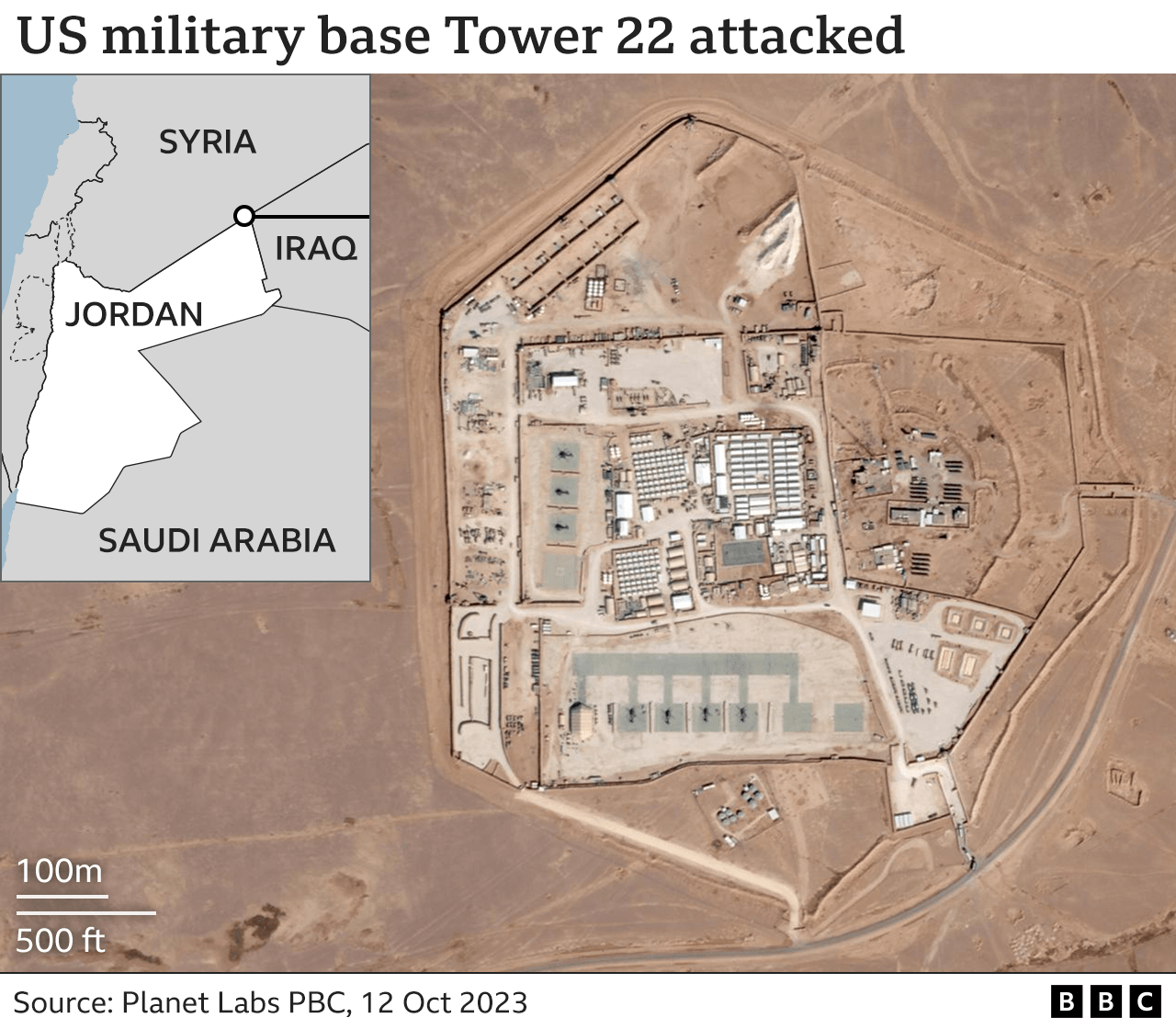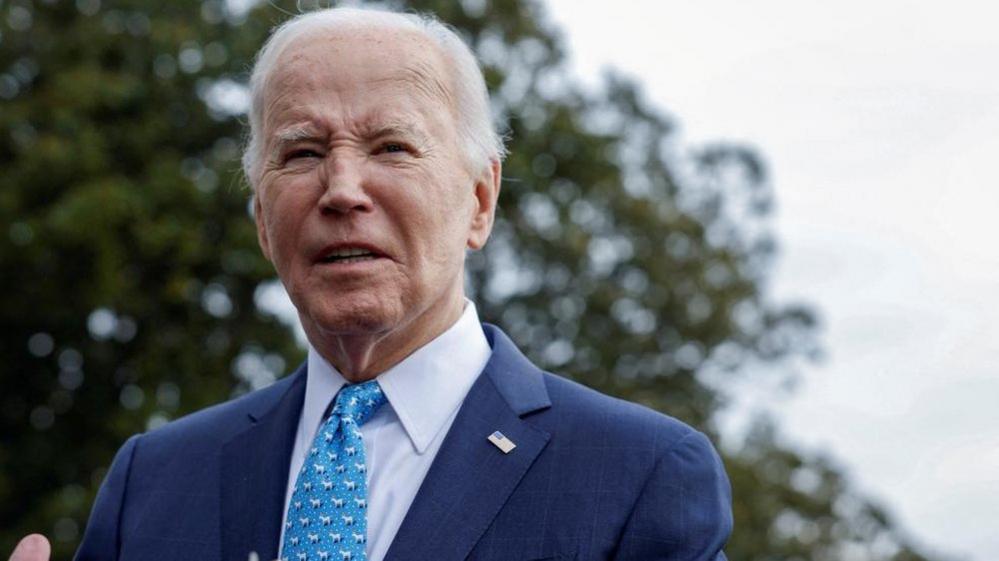Kataib Hezbollah: Iran-backed group suspends attacks against US after drone strike
- Published
Watch: Biden tells press he has decided on a response to the drone attack in Jordan
An Iran-backed Iraqi militia suspected of a drone strike in Jordan that killed three US soldiers says it has suspended operations against US forces.
Kataib Hezbollah, which is part of an umbrella group that claimed Sunday's attack, said this was "to prevent embarrassment of the Iraqi government".
The US defence department said: "Actions speak louder than words."
US President Joe Biden meanwhile said he had decided how to respond to the attack but did not elaborate.
Iran warned it would retaliate against any attack on its "interests".
Earlier, it denied US and British accusations that it was involved in the attack.
The US has hinted at an armed response that might come in several waves.
Kataib Hezbollah Secretary-General Abu Hussein al-Hamidawi said in a statement on Tuesday: "As we announce the suspension of military and security operations against the occupation forces - in order to prevent embarrassment of the Iraqi government - we will continue to defend our people in Gaza in other ways."
The three US soldiers were killed at a base next to the Jordanian-Syrian border by a "type of Shahed drone", the one-way attack drones Iran has been providing to Russia, a US official told CBS News, the BBC's US partner.
Dozens more soldiers were injured in the attack on Tower 22, which was struck while US forces were asleep in their bunks.
The US has blamed Iran-backed groups and has not yet conclusively determined that Kataib Hezbollah was behind it.
However, a Pentagon spokeswoman said it carried "the footprints" of the group.
"Actions speak louder than words," Pat Ryder told reporters after the group released its statement.
"There will be consequences," he added.

Meanwhile, the US is taking steps to bolster security at Tower 22, where some 350 US soldiers are stationed in a mission focused on defeating the Islamic State (IS) group.
Additional air defences are being sent to the base, a US official told CBS News on Tuesday, including a system designed to intercept drones.
"Certainly all roads of responsibility lead back to Iran," House Intelligence Committee Chairman Mike Turner told BBC News, also linking the country to attacks by Yemen's Iran-backed Houthi movement against ships in the Red Sea and Gulf of Aden.
"This needs to be responded in a way where they understand that we're not going to just continue to play defensive," he said.
He added that the US reaction would force Iran to "understanding that this is a conflict that is going to come to their doorstep".
Mr Biden has been weighing a number of retaliatory options, including strikes on Iran-aligned militia bases and commanders.
The US could also target senior commanders of Iran's Islamic Revolution Guard Corps (IRGC) in Iraq or Syria.
It is also possible that the US will attack inside Iran's borders, a move which is considered the highest possible escalation that Mr Biden could take.
In New York, the Iranian envoy to the UN, Amir Saeed Iravani, warned that Iran would "decisively respond to any attack on the country, its interests and nationals under any pretexts", Iran's state news agency Irna reported, external.
He also denied reports that several messages had been exchanged between the US and Iran via intermediaries over the past two days.
Watch: Parents of US soldiers killed: 'I'm still in shock'
Iran has built a wide network of allied armed groups and proxies operating in countries across the Middle East. They are all opposed to Israel and the US, and sometimes refer to themselves as the "Axis of Resistance", though the extent of Iran's influence over them is not clear.
The US says co-ordination is overseen by the IRGC and its overseas operations arm, the Quds Force. Both are designated by the US as terrorist organisations, as are a number of the regional armed groups, including Kataib Hezbollah.
The groups have dramatically stepped up their attacks against Israel, US forces and other linked targets since the start of the war between Israel and Hamas in the Gaza Strip in October, in what they say is a demonstration of their solidarity with the Palestinian people.
Many of the at least 165 drone, rocket and missile attacks on US bases in Iraq and Syria, or facilities hosting US troops, since 17 October have been claimed by an umbrella group of Iran-backed militias calling itself the Islamic Resistance in Iraq.
In response, the US says it has struck targets belonging to the IRGC and militias believed to have strong links with the force, including Kataib Hezbollah, Harakat al-Nujaba and Asaib Ahl al-Haq.
Sunday's attack, which the Islamic Resistance in Iraq said it was behind, was the first to kill US troops in the region since the start of the Gaza war.
Last month, the US said it carried out air strikes against Iran-affiliated groups after three US service members were injured, one critically, in a drone attack on a base in northern Iraq.
Earlier in January, a US strike in Baghdad killed a leader of Harakat al-Nujaba who was accused of being behind attacks on US personnel.
US Defence Secretary Lloyd Austin said last week that strikes on three facilities in Iraq belonging to Kataib Hezbollah and other groups were "in direct response to a series of escalatory attacks" against US and other international forces in Iraq and Syria.
David Gritten contributed to this article
- Published30 January 2024
